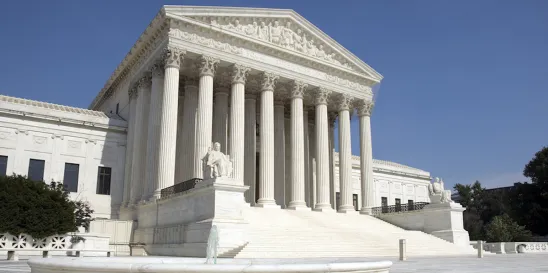App developers who pay 30% commission fee to Apple via In-App Purchasing should take note of an important legal decision recently presented to the Supreme Court for possible review. The Supreme Court’s decision whether to take the case, and its ultimate decision if it does take the case, will directly affect the commission that developers must pay Apple to sell their products using the App Store. In particular, Apple has asked the Supreme Court to limit the scope of a permanent injunction issued against it by a lower federal court in the Northern District of California in Epic Games, Inc. v. Apple, Inc. and upheld on appeal by the Ninth Circuit Court of Appeals. (Epic also filed a separate petition requesting Supreme Court review of the lower court’s rejection of certain antitrust claims, but this blog only discusses the petition filed by Apple.)
The lower court’s injunction enjoins Apple from prohibiting developers from (a) letting their customers know about an alternative (and cheaper) payment method to Apple’s In-App Purchasing, and (b) communicating with their customer via account registration within the app. The injunction applies to all app developers who use the App Store to sell their apps.
Apple argues that the lower court lacked authority under federal law to extend the injunction to third party developers who were not party to the lawsuit, and that limiting the injunction “only to Epic would not offend any applicable equal-treatment principles.” Apple also challenges application of the injunction, which is based on California’s Unfair Competition Law, to app developers outside California, including application of the injunction to developers outside the United States. Apple does not challenge application of the injunction to Epic, or Epic’s subsidiaries, or it seems, to 100 or so other developers that Epic generally identified in its lawsuit against Apple. Rather, Apple complains that “the injunction extends to millions of developers worldwide who have no affiliation with Epic or this litigation.” Apple contends that the injunction should not apply to those other developers “around the world based solely on [a federal court’s] interpretation of the law and policy of a single State [California].”
Apple urges the Court to grant review by framing the issue as whether federal law permits an injunction to extend to non-parties–i.e., other developers who sell through App Store–without either certifying a class or finding that applying the injunction to third parties is necessary in order to protect Epic.
To Apple, the financial impact of restricting the injunction to Epic and its affiliates is potentially massive, while the loss of revenue from an injunction applied to only Epic and 100 or so developers identified in the Epic’s lawsuit is immaterial compared to the entire universe of app developers. This likely explains why Apple is working hard to find a basis under federal law to challenge the scope of the injunction. (Apple cannot challenge the substantive basis for the injunction at the Supreme Court , because that is a question of California state law, not subject to Supreme Court review.)
Notably, however, Apple neglects to mention in its petition that every single third-party app developer who sells on the App Store has the exact same privity of contract with Apple via Apple’s standard developer agreement, which contains the exact same prohibited anti-steering provision, and which requires that the developers submit to California jurisdiction and law, the very same jurisdiction and law upon which the injunction is based.
In other words, the non-parties Apple alludes to all have the exact same contract as Epic, and they all face similar if not identical facts, and suffer the same consequences from Apple’s anti-steering provisions. Given that Apple, not the individual app developers, insisted that all U.S. and international developers submit to California jurisdiction and California law via the exact same contract it used with Epic, it seems disingenuous for Apple to characterize the non-parties as unrelated entities who should not benefit from an injunction, when they are subject to the very same contract terms because of Apple’s own requirements.
Narrowing the injunction so it applies only to Epic and Epic’s affiliates would allow Apple to continue profiting from the very same anti-steering provisions two federal courts have already found violate California law. It would also allow Apple to continue a practice the lower courts found illegal under the very law and jurisdiction that Apple contractually imposed on Epic and other app developers.
Because Apple’s petition focuses on app developers other than Epic, the relief Apple seeks may not have a direct adverse effect on Epic. If third party app developers want the Supreme Court to consider their views as the Court decides whether to grant review, they should make those views known in an amicus brief at the certiorari stage to oppose Apple’s petition. And if the Supreme Court grants certiorari, amicus briefs from the so called “non-parties” will be even more important because the relief Apple seeks is really just about those non-parties, not Epic.



 />i
/>i

